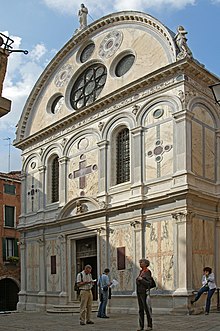
Pietro Lombardo (1435–1515) was an Italian Renaissance sculptor and architect; born in Carona (Lombardy)[1], he was the father of Tullio Lombardo and Antonio Lombardo.[2]

While his earliest documented commissions were executed in a rented workshop at San Petronio, Bologna, between July of 1462 and May of 1463, it was in early 1464 that he began work in Padua on his more celebrated wall tomb of Dodge Antonio Roselli in the Basilica of Saint Anthony.[3]
In the late 15th century, Pietro Lombardo sculpted works included in many Venetian tombs with the help of his sons. These tombs included those of Dante Alighieri, Doge Pasquale Malipiero and Pietro Mocenigo.
Situated on the wall of the entrance to the tomb of Dante Alighieri is a low relief carving by Lombardo of the poet dating to 1483.[4]
Lombardo's Monument to Dodge Pasquale Malipiero is a marble work consisting of a lunette featuring a Pietà, statuary depicting the personifications of Justice, Abundance, and Peace, and roundels decorated with the the Lion of Saint Mark. This work was completed shortly after the death of Malipiero in 1462 and is housed within the Basilica di Santi Giovanni e Paolo.[5]
The same Basilica hosts Lombardo's masterpiece Monument of Pietro Mocenigo. Executed between the years of 1476 and 1481, the monument, crafted from marble and Istrian stone, depicts the Dodge as a triumphant military leader accompanied by both allegorical and mythological figures within an triumphal arch.[6] Lombardo executed this work consisting of fifteen life-size statues with the assistance of his sons.[7]


Lombardo was the architect and chief sculptor for the Church of Santa Maria dei Miracoli, Venice (1481–1489) and of San Giobbe in Venice. Lombardo's contributions to the latter, a votive church consecrated in 1493, served as the first Renaissance building completed in Venice.[8] He also depicted saints and the Virgin Mary on the walls of several Catholic churches, often in classicized modes reflective of his exposure to the works of Donatello during his time in Padua.[9]
Pietro Lombardo is mentioned in line 27 of Canto XLV by Ezra Pound as the first in a list of Italian renaissance artists whom Pound admired.


- ^ "Biography". www.wga.hu. Retrieved 2020-11-11.
- ^ "Pietro Lombardo | Italian sculptor". Encyclopedia Britannica. Retrieved 2020-11-11.
- ^ "History of Art:The Early Renaissance - Andrea Bregno, Pietro Lombardo". www.all-art.org. Retrieved 2020-11-11.
- ^ "Dante's tomb and Quadrarco of Braccioforte". www.turismo.ra.it. Retrieved 2020-11-11.
- ^ "Monument to Doge Pasquale Malipiero by LOMBARDO, Pietro". www.wga.hu. Retrieved 2020-11-11.
- ^ "Monument of Pietro Mocenigo by LOMBARDO, Pietro". www.wga.hu. Retrieved 2020-11-11.
- ^ "Pietro Lombardo | Italian sculptor". Encyclopedia Britannica. Retrieved 2020-11-11.
- ^ "Venice Art & Culture". www.facarospauls.com. Retrieved 2020-11-11.
- ^ Valentiner, W. R. (1936-11-01). "A terracotta relief by pietro lombardo". Bulletin of the Detroit Institute of Arts of the City of Detroit. 16 (2): 21–24. doi:10.1086/BULLDETINST41501371. ISSN 0899-0271.
